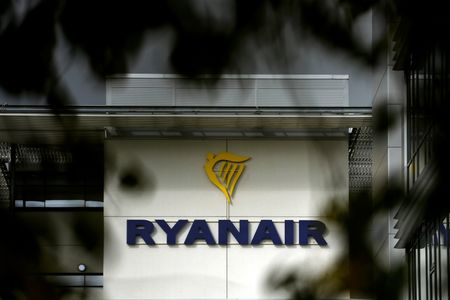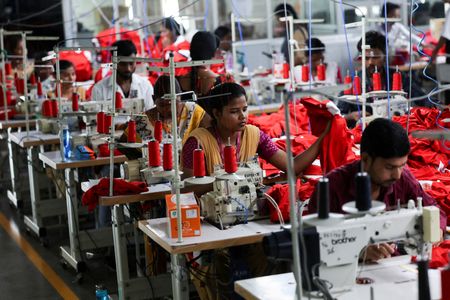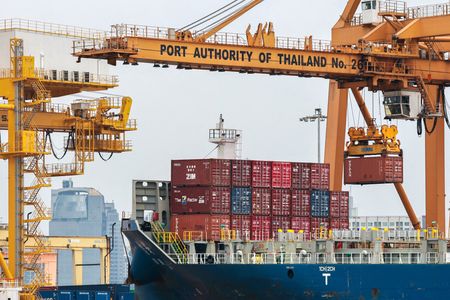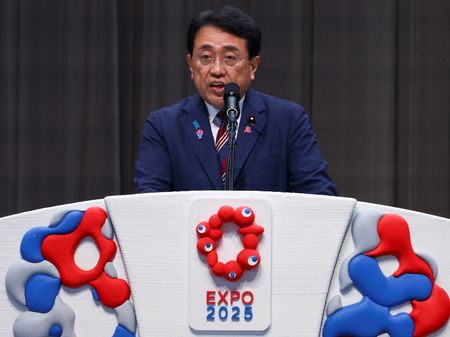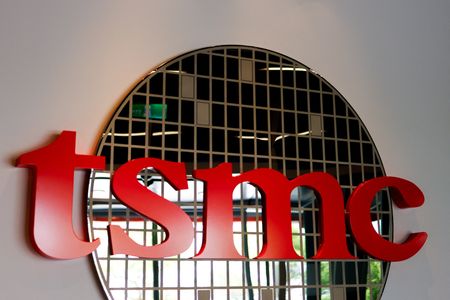By Padraic Halpin and Allison Lampert
DUBLIN (Reuters) -Ryanair on Thursday threatened to cancel orders for hundreds of Boeing aircraft if a U.S.-led tariff war leads to materially higher prices, and said it could look at alternative suppliers, including Chinese planemaker COMAC.
The threat by Europe’s largest low-cost carrier and one of Boeing’s biggest customers was the latest sign of a potential reordering of the global aerospace industry if U.S. President Trump does not exempt the sector from his tariff plans.
But with COMAC not yet certified in Europe and Boeing’s main rival Airbus saying it is sold out through the rest of the decade, Ryanair may find it hard to follow through on its threat, one industry source said.
In a letter to a senior U.S. lawmaker, Ryanair’s chief executive Michael O’Leary said Trump’s tariffs could threaten 330 Boeing 737 MAX aircraft that his airline has on order, which have a list price of more than $30 billion.
“If the U.S. government proceeds with its ill-judged plan to impose tariffs, and if these tariffs materially affect the price of Boeing aircraft exports to Europe, then we would certainly reassess both our current Boeing orders, and the possibility of placing those orders elsewhere,” O’Leary said.
The letter, seen by Reuters, was a response to a warning by U.S. Representative Raja Krishnamoorthi, a Democrat from Illinois, about the security implications of Ryanair following through on an earlier suggestion it might consider a COMAC order.
Boeing was not immediately available for comment.
CHANGE OF TONE
The threat to cancel orders marked a hardening of tone from O’Leary, who in April had threatened to delay deliveries. In March he said that Boeing executives had privately expressed confidence that aircraft would be exempted from Trump’s tariffs.
Aircraft industry sources say Boeing and Airbus contracts do not include any provision for tariffs, since the industry has for decades operated without them. Tariffs only become due once ownership of the aircraft has passed to the purchasing airline and the contract has been completed.
Most aircraft purchase contracts include a clause requiring all sides to pay their own taxes without explicitly mentioning tariffs, the sources said. But many aerospace companies are said to be reviewing the wording of contracts for future deals on the assumption that trade turbulence will remain for some time.
O’Leary’s comments in the letter may in part be a tactical intervention ahead of a period of potentially tough negotiations with Boeing behind the scenes, the industry sources said.
CONSIDERING COMAC
O’Leary said in the letter the Irish airline has not had any discussions with COMAC about aircraft purchases since about 2011 but that it would “of course” consider it if they were 10%-20% cheaper than Boeing’s main rival Airbus.
Airbus, which is Boeing’s only competitor for large single-aisle aircraft that are currently certified in Europe, has repeatedly said it is sold out through the rest of the decade.
No Western airline has bought a COMAC plane. The Chinese company has applied for certification for its C919 jet in Europe but not in the United States.
The C919 jet is around 150 seats or up to around 190 in dense layouts, smaller than the Boeing planes Ryanair currently flies and the MAX 10, which make up most of the planes it has on order, which can seat up to 230.
Ryanair’s threat comes as Boeing is looking to resell potentially dozens of planes locked out of China by tariffs after repatriating a third jet to the United States in a delivery standoff that prompted more criticism of Beijing from Trump.
It is rare for airlines to cancel airplane contracts rather than delay delivery because of the small number of suppliers and the risk of returning to the back of the queue for capacity, dampening growth, analysts say.
And attempts by airlines to cancel contracts are typically resisted by planemakers, who can cite a list of excusable factors like supply chain delays, according to industry sources and previous court filings.
(Additional reporting by Tim Hepher; Writing by Padraic Halpin and Conor Humphries; Editing by Jane Merriman)

